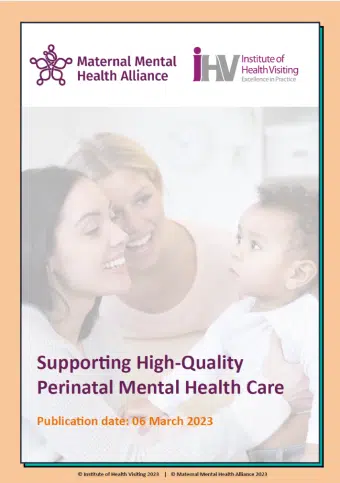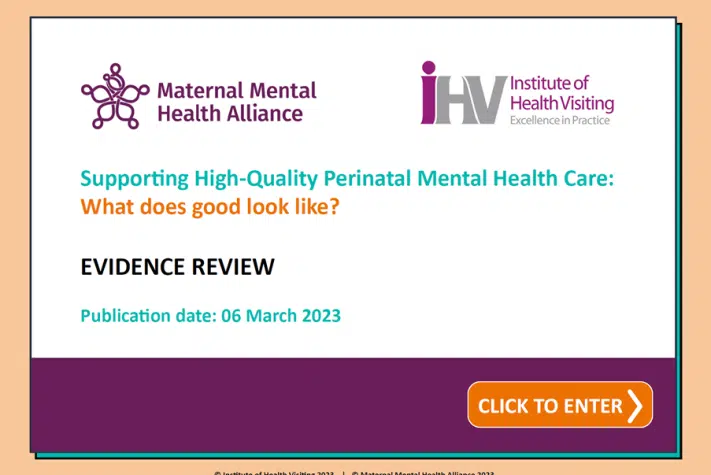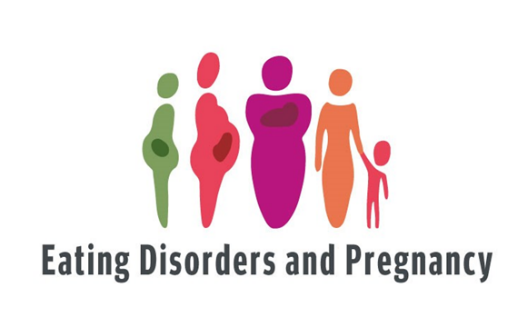iHV and the Maternal Mental Health Alliance (MMHA) are proud to share a new resource and accompanying evidence to support high-quality Perinatal Mental Health (PMH) Care.
The Institute has worked closely with the MMHA for many years to bring about positive change for the mental health and wellbeing of families and there have been huge strides made, but there is still some way to go:
- At least 1 in 5 women experience a PMH problem, making mental illness the most common serious health problem that a woman might experience in the perinatal period.
- Suicide is still the leading cause of death for women when looking across the perinatal period.
- The 2022 MBRRACE report again highlighted gaps in mortality rates between women from deprived and affluent areas, women of different ages, and women from different ethnic groups.
- Evidence continues to show that people, who identify as LGBTQI+, experience prejudice and discrimination generally and within healthcare services which can lead to worse physical and mental health in the perinatal period.
This latest project brought us together to think about how we can support developing PMH systems across all four nations. The changing landscape of how care is accessed and delivered offers an opportunity for systems to come together to support inclusive high quality family mental health care and this is what led to the latest collaboration between the iHV and MMHA. It has led to the iHV undertaking an evidence review, which we feel will be incredibly useful for families, practitioners and services.
The Evidence Review, conducted by the iHV, is is a comprehensive desktop review that brings together key publications, policy guidance, toolkits, research, and reports of families’ and practitioners’ lived experiences. The focus of the review is “what does high-quality perinatal mental health care look like?” for women, birthing people and their families. Key themes and principles emerging from the evidence review are captured in the related resource:
Supporting High-Quality Perinatal Mental Health Care is the new resource drawn from the Evidence Review. It provides a strengths-based action template to enable and inform high-quality care for families impacted by PMH problems – enabling individuals to come together and plan “what good looks like” for them, as practitioners, services, professions, organisations, pathways, networks, and systems. This new resource highlights:
- Why improving PMH care is crucial
- What good care looks like to both practitioners and families with lived experience
- 10 principles of best practice
Karen Middleton, Head of Campaigns and Policy, MMHA, says:
“The iHV’s literature review has been incredibly helpful to understand the wealth of information out there on maternal mental health and what action is still needed to ensure high-quality care is available to all who need it. During the review, several recurring themes quickly emerged as well as clear opportunities for learning across the system, as highlighted in the final resource.
“In recent years, there has been a welcome increase in the understanding of the impact of maternal mental health problems. However, many still face huge barriers to accessing essential care. I hope this work will encourage local systems to have collaborative conversations and help them continue to develop services that provide high-quality maternal mental health support for women and birthing people, babies, and families across the UK.”
Melita Graham, Head of Mental Health, iHV, says:
“Family mental health and wellbeing is complex and, whilst individuals, different professions and services can, and do, make a huge difference – we know that by joining the junctions and pulling together we can achieve so much more. Working closely with the Alliance I have seen the power of collective effort and the positive differences this has made. This latest project aims to support all parts of the PMH system to come together, to think together and to act together – we know that when people with a common interest come together, great things can happen!
“The Institute is committed to promoting family mental health and wellbeing, addressing inequalities and driving change. Alongside the MMHA and other partners, we won’t stop until every family, has access to high quality mental health care in the perinatal period. We very much hope that these new resources will enable high quality perinatal mental care irrespective of where a family may live in the UK.”









